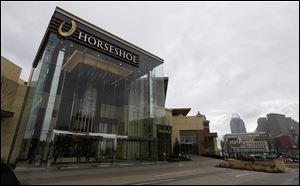
Thousands of guests expected as 4th voter-approved Ohio casino gets set to open in Cincinnati
3/4/2013
Horseshoe Casino Cincinnati opens today to the public in downtown Cincinnati.
CINCINNATI — The last of four voter-approved Ohio casinos announced its opening with a bang on Monday, as fireworks exploded over downtown Cincinnati, club music boomed through the streets and thousands of die-hard gamblers and curious first-timers poured inside.
After more than two years of construction — and about four years after Ohio voters approved of putting casinos in the state to boost jobs and the economy — the $400 million Horseshoe Casino Cincinnati opened to the public with workers cheering on arriving patrons.
The crowd began lining up in frigid temperatures and drizzle more than two hours before the casino opened on what used to be a run-down parking lot. Now it's a two-story, brightly lit casino with a giant glass entrance, three outward facing restaurants and a grand plaza that will be the site of outdoor concerts and other events designed to draw people in.
“Are you excited, Cincinnati!” shouted Mayor Mark Mallory just before the fireworks show and the casino opened.
Mallory said he had wanted Cincinnati's casino to be the first to open in the state. “But we saved the best for last!” he told the crowd.
Many were clearly excited to be the casino's first guests, with some people dancing suggestively and cheering when cameras showed them on a giant screen set up in front of the casino. Others complained about the long wait, the cold, limited parking and other logistics.
“Already it's been a hassle,” said Geraldine Parker, a 57-year-old retired Cincinnati resident who said that while the casino is “gorgeous,” she was upset that all the parking on the property for opening night was reserved for VIPs.
Parker, who parked across the street for $10, said she frequents the Hollywood Casino about 25 miles west in Lawrenceburg, Ind., and spends thousands of dollars there. It will take a lot for Cincinnati's casino to win her over, she said.
“They've got to treat me right because I'm spending a lot of money,” she said.
Fatima Shakoor, a retired nurse wearing a jean jacket decorated with sequined dice and poker chips, said she would be gambling for the first time in her life at the casino, simply because none have ever been close enough for her to try her luck until now.
“I'll start off with $50,” said Shakoor, 63, who lives just up the street. “It's something to do. I know I shall not be disappointed.”
Mallory has previously said that the casino will be a home run for the city, although projected revenues are far lower now than when Ohio voters approved casinos in 2009.
“This casino will have the ability to draw people from all around the country,” Mallory said.
Though no hotels are attached, and nothing quite compares to the energy or spectacle of the Vegas strip, Mallory said the Cincinnati casino is big time. The casino boasts a VIP players’ lounge with limits as high as $50,000, a World Series of Poker room. Its restaurants include Jimmy Buffett's Margaritaville and a burger joint from celebrity chef Bobby Flay. Both Buffett and Flay also have outposts in Las Vegas.
Flay, who was in town for the opening of the 14th Bobby's Burger Place, said the casino felt just like Vegas.
“I think it's incredible,” Flay said inside the casino. “It's a Vegas casino. I've seen some other regional casinos and they're not even close to this.”
Cincinnati's casino is projected to draw about $227 million in gross revenue in its first year. That would bring in about $75 million in taxes.
Casinos in Cleveland, Toledo and Columbus all opened over the past year and have brought in nearly $404 million combined. From that, about $133.2 million has gone to Ohio schools, counties and cities.
Ohio's casinos were originally forecast to bring in nearly $2 billion annually. Now, their yearly revenues are expected to be just under $1 billion.
Industry experts say the lower revenues are a result of the economic climate and competition from storefront gambling-style operations in the state known as Internet cafes.
Another visitor to Cincinnati's casino on Monday was Sam Cox, 45, who drove from about 25 miles away in Foster, Ky., to try out the slots and some table games.
“We want to see what it looks like,” said Cox, who said that he thought the casino would be good for the community by generating more tax dollars, even if they were going to Ohio coffers.
Kentucky law does not allow for casino gambling, although that state's governor has been trying to get the issue passed since he took office in 2007.
Ebony Box, a 37-year-old Cincinnati resident who had wanted to get a glimpse inside the casino, left shortly after arriving because of a long line.
She said she was excited about the casino but felt that money spent on building it would have been better if put toward affordable housing for the city's poorer residents. She also expressed concerns about the casino's proximity to a government-assistance office, saying that some people are bound to gamble much-needed money away in an effort to make more.